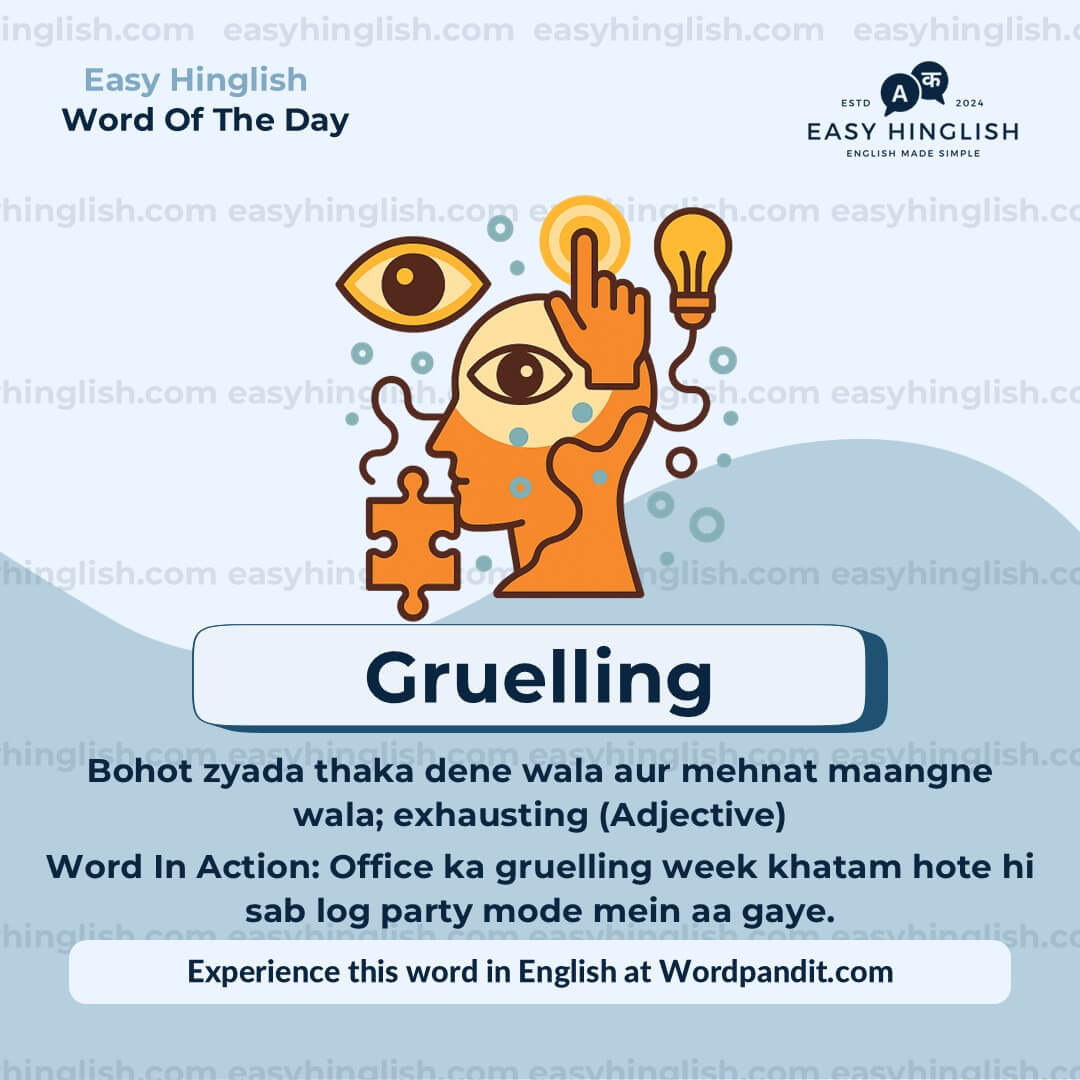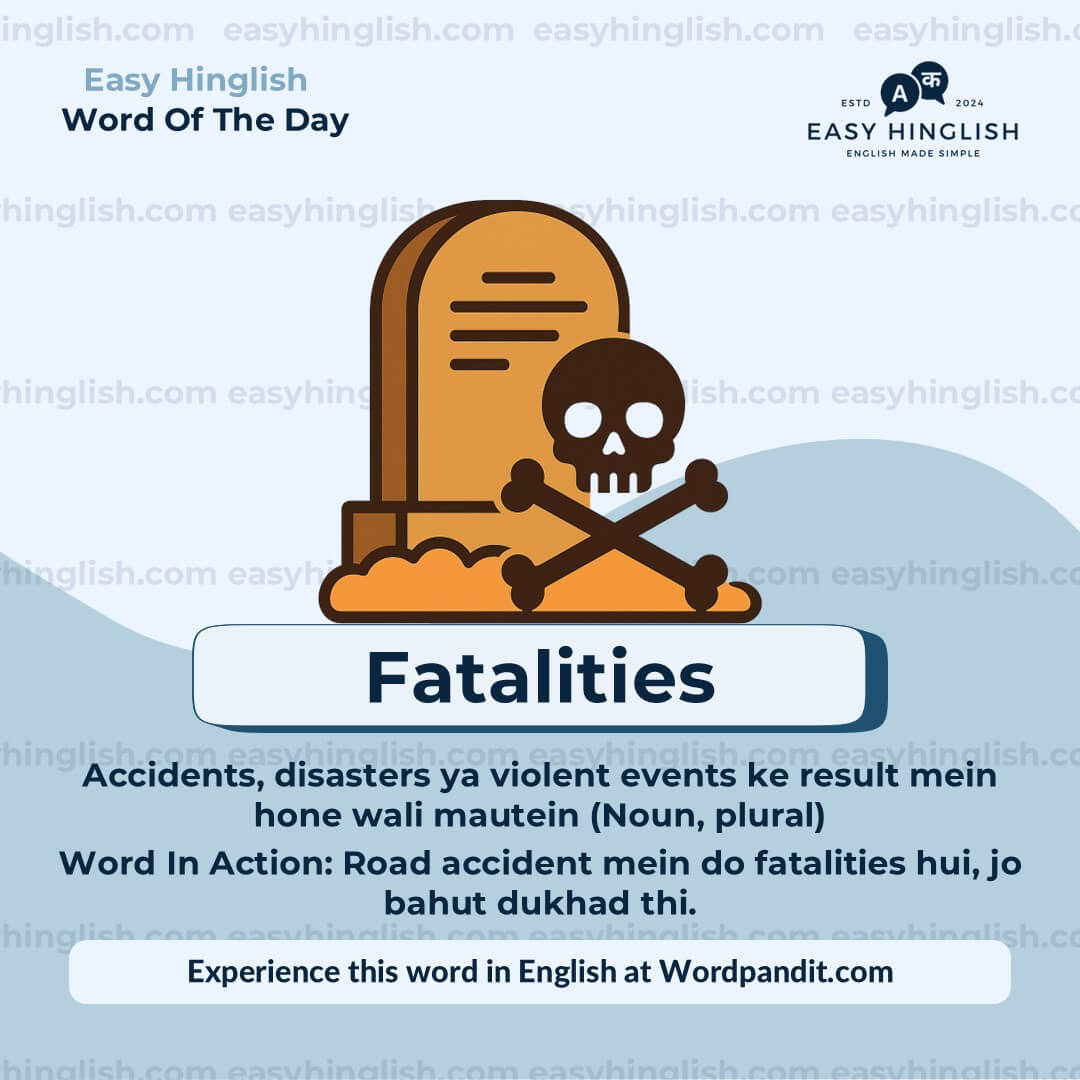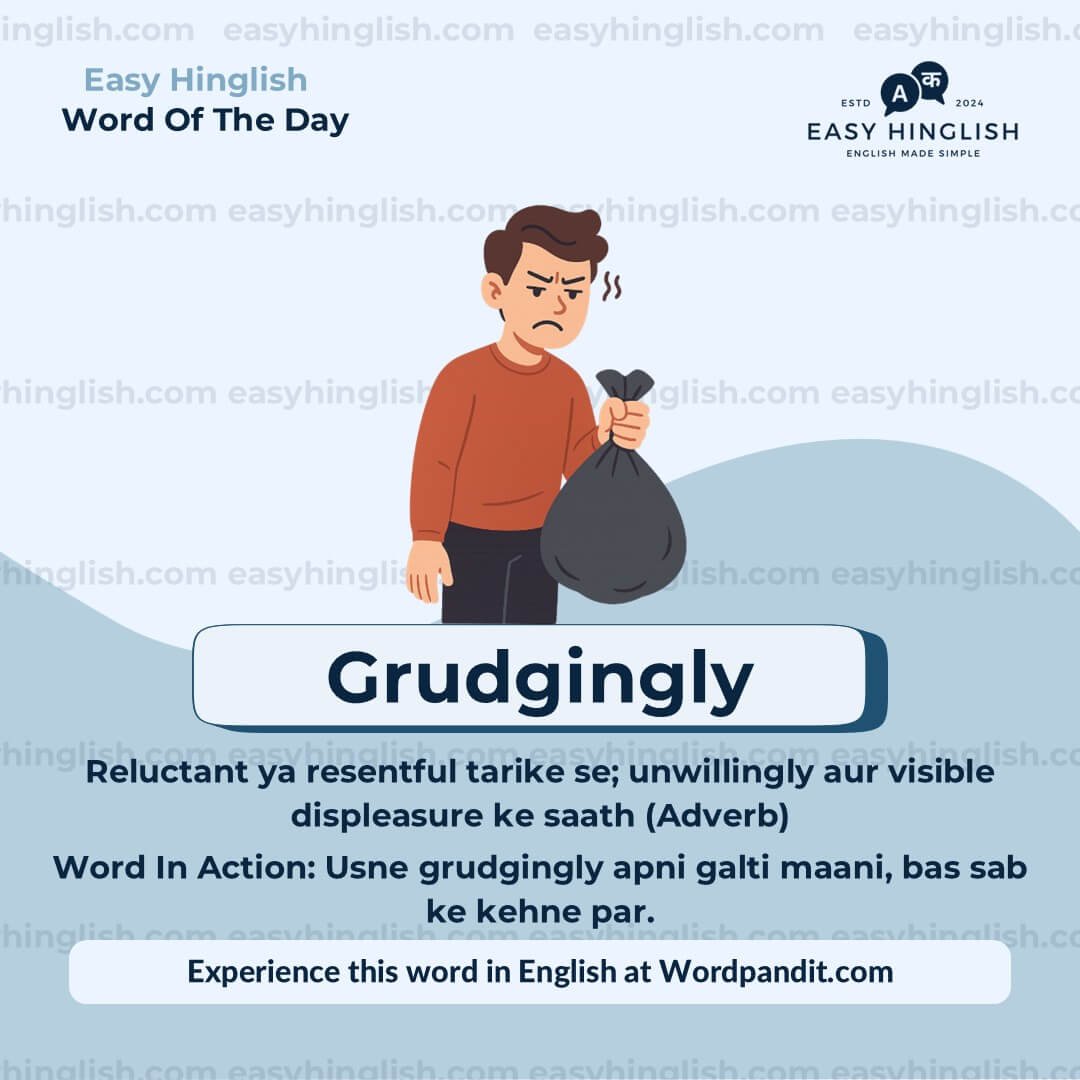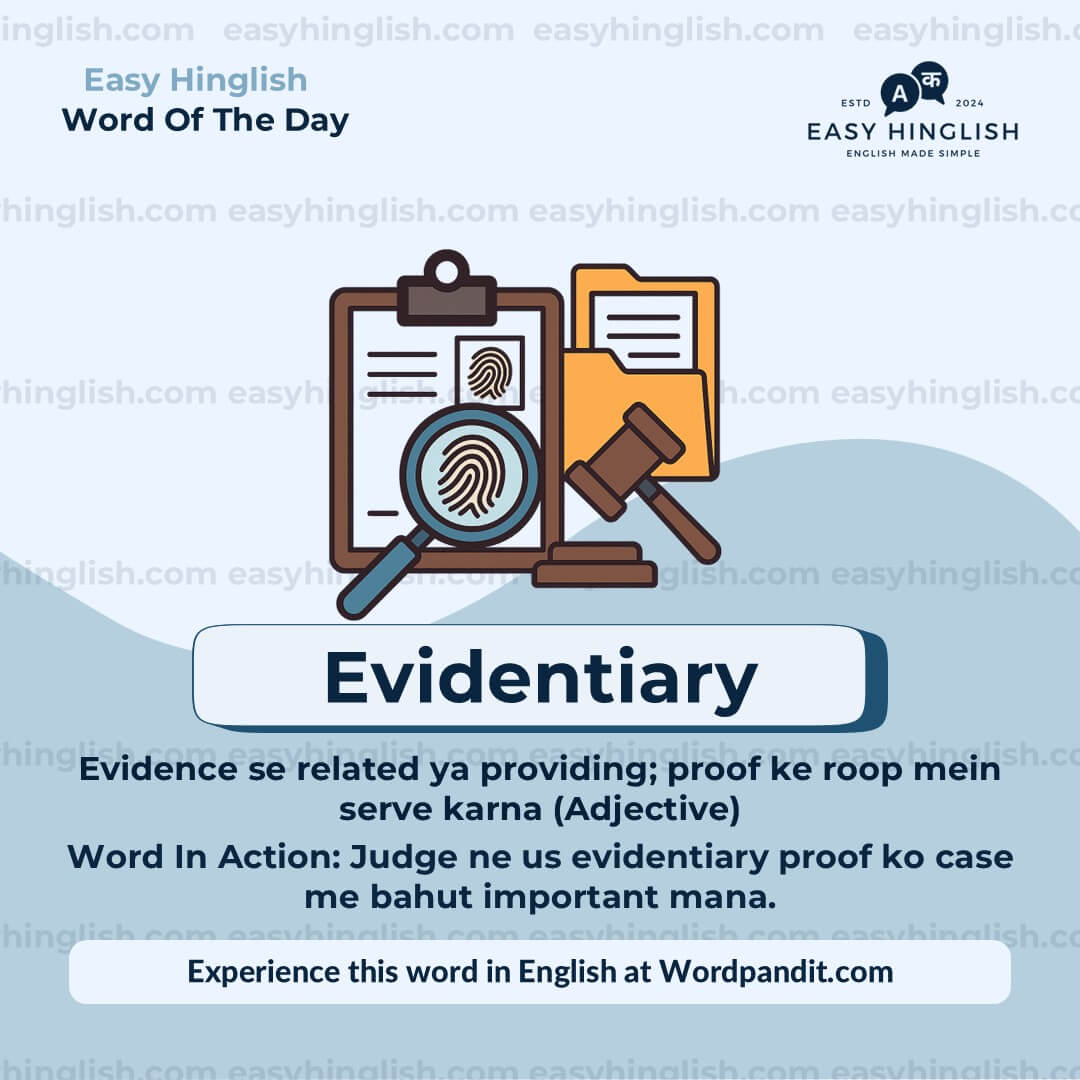Daily Vocabulary Indian Newspapers aur Publications se Seekho
Welcome to Wordpandit ka Indian Vocabulary Hub
Wordpandit par, hum samajhte hain ki ek achhi vocabulary develop karne ke liye local context samajhna bhi zaroori hai. Is section ka focus hai aapke vocabulary ko India ke leading newspapers aur publications se naye shabdon aur phrases ke zariye improve karna, taaki aap practical, relevant, aur uniquely Indian words seekh sakein.
Indian Sources Itne Important Kyun Hain?
Hum maante hain ki kisi bhi language ko sikhne ka sabse best tareeka hai uske local content me immerse hona. Isi wajah se hum carefully words curate karte hain top Indian newspapers aur publications se, jaise:
- The Hindu
- The Times of India
- The Economic Times
- Hindustan Times
- Live Mint
- The Indian Express
- Aur bhi bahut saare...
Hamesha Updated Raho, Hamesha Relevant Raho
Daily updates ke saath, aap Indian news sources se naye words seekhoge jo Indian society aur culture ke latest trends ko reflect karte hain. Hamara focus hai aise words provide karna jo aapke liye real-world me useful ho.
Wordpandit Aapke Learning Goals Ko Kaise Support Karta Hai?
Chahe aap exams ki preparation kar rahe ho, professional communication improve karna chahte ho, ya sirf naye words seekhna chahte ho, Wordpandit har step par aapki madad karega.
Practical Tareeke Se Seekho
Hamari interactive learning methodology me real-world examples, engaging activities, aur context-based usage shamil hain, taaki har naya shabd aapki active vocabulary ka hissa ban sake.
Aaj Hi Indian Vocabulary Seekhna Shuru Karo!
Wordpandit Kyun Choose Karein?
Practical Learning: Aise words seekho jo aapko real-world reading aur communication me sach me kaam aayenge, taaki aapki comprehension aur bolne ki skills improve ho.
Diverse Content: Current affairs se lekar scientific breakthroughs tak, hamare different sources aapko multiple domains ka vocabulary sikhate hain.
Effortless Integration: Wordpandit ko apni daily routine ka part banao. Sirf kuch minute har din dene se aapki vocabulary time ke saath kaafi improve ho sakti hai.
Aapka Vocabulary Mastery Tak Ka Safar
- Regularly hamare Daily Vocabulary section ko visit karo
- Naye words explore karo aur unka context me use samjho
- In words ko apni writing aur bolne ki practice me use karne ki koshish karo
- Jaise-jaise aapke words badhte hain, apni progress ko track karo
Aaj Se Apni Vocabulary Journey Shuru Karo!
Wordpandit ke saath vocabulary improve karna start karo. Roz thoda effort dalne se aap ek strong vocabulary develop kar sakte ho jo academic, professional, aur personal life me kaafi kaam aayegi.
Yaad rakho, ek naya shabd roz seekhna linguistic limitations ko door karne ka best tareeka hai! Wordpandit ko apni daily learning journey ka sathi banao aur vocabulary excellence ki taraf badho!
WORD-1: Gruelling
Sandarbh (Context):
"Association ka maanna hai ki 10-year jail term men ko gruelling transportation sector mein join hone se discourage karega, jahan pehle se hi 27% drivers ki shortage hai. India ki supply chain ki lifeline disrupted ho gayi." - Times of India
Vyakhya (Explanatory Paragraph):
Gruelling ka matlab hai 'bohot zyada thaka dene wala aur demanding, physically aur mentally dono tarah se.' Yeh word tab use hota hai jab kisi task, experience ya situation ko describe karna ho jo intense effort aur endurance maangta hai lambe time tak. Gruelling ko formal writing, news articles aur competitive exam passages mein use karte hain jab challenges ki severity aur exhausting nature ko emphasize karna ho—chahe professional contexts mein ho, sports mein, ya demanding work conditions mein.
Arth (Meaning): Bohot zyada thaka dene wala aur mehnat maangne wala; exhausting (Adjective)
Uccharan (Pronunciation): ग्रू-अ-लिंग (GROO-uh-ling)
Kathinai Star (Difficulty Level): ⭐⭐⭐ Intermediate
Utpatti (Etymology): Gruelling verb 'gruel' se aaya hai jiska original meaning tha 'punish karna ya exhaust karna.' 'Gruel' khud ek patli, watery porridge ko refer karta tha jo beemar ya gareeb logon ko diya jata tha. Time ke saath, 'gruelling' evolve hua aur ab yeh kisi bhi aise experience ko describe karta hai jo insaan ko itna kamzor aur thaka hua bana de jaise woh sirf patli gruel par survive kar raha ho.
Prashant Sir Ke Tathya (Prashant Sir's Notes):
Bahut students gruelling ko 'challenging' se confuse karte hain—dono difficult situations describe karte hain, lekin gruelling ka usage specifically physical aur mental exhaustion ko emphasize karta hai prolonged time ke liye. Gruelling aur difficult mein farak yeh hai ki gruelling mein hamesha sustained suffering aur extreme tiredness involved hoti hai. CAT aur GRE ke students ke liye, gruelling aksar labor conditions, sports achievements, ya demanding professions ke passages mein dikhta hai. Indian newspapers mein aapko 'gruelling work hours,' 'gruelling schedule,' ya 'gruelling journey' milega—yeh combinations signal karte hain na sirf difficulty balki sustained physical aur mental drain jo human endurance test karta hai. Yaad rakhein: gruelling ka sahi istemal kaise karein—yeh word tab use karein jab prolonged exhaustion dikhana ho, na ki sirf temporary difficulty.
Samanarthi & Vipritarthi (Synonyms & Antonyms):
Samanarthi (Synonyms): exhausting, punishing, demanding, taxing, arduous, backbreaking, draining, strenuous, thaka dene wala, kathin
Vipritarthi (Antonyms): easy, effortless, relaxing, comfortable, pleasant, aasaan
Udaharan (Usage Examples):
- Hospital mein gruelling 12-hour shift complete karne ke baad, Dr. Sharma ghar drive karte waqt apni aankhein khuli rakh hi nahi pa rahi thi.
- Full-time job sambhalte hue UPSC ki taiyari Priya ke liye ek gruelling do-saal ka journey sabit hua, lekin usne kabhi haar nahi maani.
- Construction workers ko Mumbai ke summer months mein gruelling conditions ka saamna karna pada, jahan woh scorching sun ke neeche minimum breaks ke saath kaam karte the.
- Virat Kohli ne Australia mein five-match Test series ko mentally aur physically gruelling bataya, jo har player ki resilience aur stamina test kar deta hai.
Sanskritik Sandarbh (Cultural Reference):
"Kisi bhi field mein success ke liye gruelling early years survive karne padte hain jab koi tumhara naam tak nahi jaanta." - Bollywood actors apne struggle period ke baare mein
Sochiye (Think About It):
Hum success ki gruelling journeys ko romanticize kyun karte hain, lekin transportation aur construction jaise industries mein gruelling working conditions ki human cost ko ignore kar dete hain?
Chhoti Kriya (Quick Activity):
Apne kisi gruelling experience ke baare mein do sentences likhein—ek academic life se aur ek personal life se. Focus karein exhaustion aur sustained difficulty ko convey karne par.
Yaad Karne Ka Tarika (Memory Tip):
'Gruelling' ko aise yaad rakhein: 'GREW-KILLING'—imagine karo kaam itna exhausting hai ki tumhari energy ko kill kar raha hai jaise jaise din grow kar raha hai. 'Gruel' (patli soup) se connection bhi madad karta hai: kuch gruelling tumhe itna drain kar deta hai jaise tum sirf watery gruel par survive kar rahe ho.
Vastavik Jeevan Me Upyog (Real-World Application):
Gruelling commonly journalism, sports commentary aur business reports mein use hota hai demanding schedules, challenging work environments, ya exhausting competitions describe karne ke liye. Formal writing aur exam essays mein, sirf 'difficult' ya 'hard' ki jagah 'gruelling' use karne se precision aur intensity add hoti hai, jo dikhata hai ki aap challenging tasks aur truly exhausting ordeals ke beech ka farak samajhte hain. Yeh particularly labor rights discussions, sports analysis aur professional development contexts mein effective hai.
WORD-2: Fatalities
Sandarbh (Context):
"2022 mein, hit-and-run cases mein lagbhag 59,000 log mare gaye, jo total road fatalities ka 30% tha. Maharashtra mein 2022 mein har ghante ek vyakti highway accident mein mara, jo previous year se 14% zyada hai. Indians callous drivers ho sakte hain, rules ya regulations ki koi parwah nahi." - Times of India
Vyakhya (Explanatory Paragraph):
Fatalities ka matlab hai 'accidents, disasters, wars ya dusre tragic incidents se hone wali mauton ki sankhya.' Yeh word tab use hota hai jab specific events ya circumstances mein kitne log mare gaye, yeh formally batana ho, particularly official contexts mein. Fatalities ka upyog news reports, government statistics aur competitive exam passages mein hota hai accidents, natural disasters, conflicts ya health crises mein casualties discuss karne ke liye, jo current affairs aur analytical writing samajhne ke liye zaroori vocabulary hai.
Arth (Meaning): Accidents, disasters ya violent events ke result mein hone wali mautein (Noun, plural)
Uccharan (Pronunciation): फ़-टैल-इ-टीज़ (fuh-TAL-ih-teez)
Kathinai Star (Difficulty Level): ⭐⭐ Basic se Intermediate
Utpatti (Etymology): Fatalities Latin word 'fatalis' se aaya hai jiska matlab hai 'destined' ya 'fate dwara tay kiya gaya,' jo khud 'fatum' se derive hua hai jiska matlab hai 'fate' ya 'destiny.' Yeh word Old French 'fatal' ke through evolve hua aur kisi aise cheez ko describe karne laga jo fate dwara determined ho, khaaskar death. 18th century tak, 'fatality' specifically accident ya disaster se hui maut ko mean karne laga, jo aise losses ki tragic aur inevitable nature ko emphasize karta hai.
Prashant Sir Ke Tathya (Prashant Sir's Notes):
Students aksar poochhte hain: fatalities aur casualties mein kya farak hai? Dono tragic events se affected logon ko refer karte hain, lekin fatalities ka matlab specifically deaths hai, jabki casualties mein deaths aur injuries dono include hote hain. UPSC aur CAT ke students ke liye, fatalities aksar road safety, disaster management aur public health ke passages mein dikhta hai—yeh distinction samajhna comprehension questions accurately answer karne ke liye crucial hai. Indian newspapers mein aapko commonly 'road fatalities,' 'accident fatalities,' ya 'zero fatalities' milega—yeh formal term official reports mein casual words jaise 'deaths' se prefer kiya jata hai kyunki yeh in tragedies ki statistical aur preventable nature ko emphasize karta hai. Fatalities ka sahi istemal kaise karein: jab bhi numerical data ya official statistics ki baat ho, 'fatalities' use karein formal tone maintain karne ke liye.
Samanarthi & Vipritarthi (Synonyms & Antonyms):
Samanarthi (Synonyms): deaths, casualties (jab fatal ho), mortalities, losses, victims, death toll, mrityu sankhya, hatahaton ki sankhya
Vipritarthi (Antonyms): survivors, recoveries, rescues, survivals, bachne wale
Udaharan (Usage Examples):
- Government ne naye road safety measures announce kiye jab Uttar Pradesh mein highway fatalities festival season ke dauran 22% badh gayi.
- Improved safety protocols ke bawajood, construction industry abhi bhi major Indian cities ke building sites par workers mein high fatalities report karti hai.
- Kerala mein monsoon floods ke result mein numerous fatalities hui, jisse state government ko apne disaster preparedness aur early warning systems review karna pada.
- Aviation experts ne Air India ke safety record ki tareef ki, noting kiya ki challenging weather conditions ke bawajood past five years mein domestic operations mein zero fatalities rahi.
Sanskritik Sandarbh (Cultural Reference):
"India globally sabse zyada road fatalities record karta hai, har saal lagbhag 1.5 lakh deaths ke saath—ek silent epidemic jo kai bimariyon se bhi zyada lives claim karti hai." - Nitin Gadkari, Union Minister for Road Transport and Highways
Sochiye (Think About It):
Hum har din newspapers mein road fatalities ke baare mein padhkar desensitized kyun ho jate hain, aur unhe mere statistics ki tarah treat karte hain rather than individual human tragedies?
Chhoti Kriya (Quick Activity):
Aaj ke newspaper mein check karein ki 'fatalities' ya 'fatal' word accident reports mein kitni baar appear hota hai. Context aur specific numbers notice karein—yeh aapko formal news writing style samajhne mein madad karega.
Yaad Karne Ka Tarika (Memory Tip):
'Fatalities' ko 'FATE-AL-TIES' se connect karein—imagine karo fate logon ko tragic outcomes se tie kar rahi hai. Ya yaad rakhein ki 'fatal' 'fate-full' jaisa lagta hai, aur fatalities woh deaths hain jo ek tragic fate fulfill karti hain. Yeh word 'fate' ke saath apni root share karta hai, jo yaad rakhna aasaan banata hai ki yeh destined ya inevitable deaths ko refer karta hai.
Vastavik Jeevan Me Upyog (Real-World Application):
Fatalities essential vocabulary hai journalism, government reports, policy documents aur academic research papers mein jo public safety, health crises aur disaster management deal karte hain. Competitive exam essays aur formal writing mein, casual terms jaise 'deaths' ki jagah 'fatalities' use karne se professional language skills aur appropriate register ki awareness demonstrate hoti hai. Yeh word particularly un aspirants ke liye important hai jo civil services, public policy ya journalism careers target kar rahe hain, jahan casualties aur deaths ke baare mein precise terminology accurate reporting aur analysis ke liye crucial hai.
WORD-3: Congestion
Sandarbh (Context):
"Ek better run city mein Metro frequency suitably badhayi jaati, special pedestrian aur parking zones enforce kiye jaate, aur social media par constant congestion alerts diye jaate." - Times of India
Vyakhya (Explanatory Paragraph):
Congestion ka matlab hai 'overcrowded ya blocked hone ki sthiti, khaaskar traffic ya limited spaces mein.' Yeh word tab use hota hai jab bohot saare log, vehicles ya cheezein ek limited space mein ho jaati hain, jisse delays aur difficulties hoti hain. Congestion kaise use karte hain: yeh commonly urban planning discussions, traffic reports, medical contexts (nasal congestion) aur competitive exam passages mein infrastructure challenges ke baare mein dikhta hai, jo contemporary civic issues samajhne ke liye valuable vocabulary hai.
Arth (Meaning): Overcrowded, blocked ya clogged hone ki sthiti; ek jagah par excessive accumulation (Noun)
Uccharan (Pronunciation): कन-जेस-चन (kun-JES-chun)
Kathinai Star (Difficulty Level): ⭐⭐ Basic se Intermediate
Utpatti (Etymology): Congestion Latin word 'congestus' se aaya hai, jo 'congerere' ka past participle hai, jiska matlab hai 'saath mein lana' ya 'pile up karna.' Prefix 'con-' ka matlab hai 'together' aur 'gerere' ka matlab hai 'carry karna.' Originally medical contexts mein use hua tha body parts mein blood ya fluid ke accumulation ko describe karne ke liye, lekin 19th century tak yeh word traffic aur urban crowding describe karne laga, jo industrialization aur growing cities ki challenges reflect karta tha.
Prashant Sir Ke Tathya (Prashant Sir's Notes):
Bahut students congestion ko 'crowding' se confuse karte hain—dono mein ek jagah par bohot saare log ya cheezein hoti hain, lekin congestion ka usage specifically resulting blockage aur freely move na kar paane ko emphasize karta hai. Congestion aur crowding mein farak yeh hai ki congestion mein hamesha restricted flow aur dysfunction implied hota hai, sirf high density nahi. CAT aur UPSC ke students ke liye, congestion aksar urban development, infrastructure planning aur environmental issues ke passages mein dikhta hai. Indian newspapers mein aapko 'traffic congestion,' 'congestion pricing,' aur 'congestion charge' milega—yeh technical terms hain urban policy discussions mein jo solutions signal karte hain overcrowded cities jaise Delhi, Mumbai aur Bangalore ko manage karne ke liye. Yaad rakhein: congestion ka sahi istemal tab karein jab blocked flow ya restricted movement dikhani ho, na ki sirf bheed.
Samanarthi & Vipritarthi (Synonyms & Antonyms):
Samanarthi (Synonyms): overcrowding, blockage, gridlock, bottleneck, jam, clogging, obstruction, crowding, traffic snarl, bheed-bhaad, ruk-ruk kar chalna
Vipritarthi (Antonyms): free flow, clear passage, openness, space, ease of movement, fluidity, khuli sadak
Udaharan (Usage Examples):
- Bangalore ki chronic traffic congestion city ko har saal estimated ₹1.5 lakh crore ka nuksan kara deti hai lost productivity aur wasted fuel mein.
- Mumbai Municipal Corporation ne South Mumbai ke liye congestion pricing propose ki taaki peak hours ke dauran private vehicles discourage ho aur public transport promote ho.
- Delhi ki air quality winter mein significantly kharab ho jaati hai vehicular congestion, stubble burning aur atmospheric conditions ki wajah se jo pollutants trap kar leti hain.
- Anika ke doctor ne decongestant prescribe ki uske nasal congestion ko relieve karne ke liye jo Bangalore ke pollen season ke dauran seasonal allergies se hua tha.
Sanskritik Sandarbh (Cultural Reference):
"Mumbai ki traffic congestion itni legendary ho gayi hai ki Bollywood films routinely stuck-in-traffic scenes use karti hain time ka passage dikhane ya dramatic tension build karne ke liye." - Urban cinema studies mein common observation
Sochiye (Think About It):
Agar traffic congestion Indian cities ko har saal billions cost karti hai aur daily millions ko affect karti hai, toh hum zyada roads banane ko priority kyun dete hain instead of public transportation infrastructure mein invest karne ke?
Chhoti Kriya (Quick Activity):
Alag-alag contexts mein 'congestion' use karke do sentences likhein—ek apne city ki traffic ke baare mein aur doosra health-related situation ke baare mein. Notice karein ki word different domains mein kaise adapt hota hai.
Yaad Karne Ka Tarika (Memory Tip):
'Congestion' ko 'CON-JESTION' ke roop mein socho jahan 'con' ka matlab hai 'together' aur imagine karo sab kuch ek jagah par push ya jest karke together ho gaya hai, jo ek jam create kar raha hai. Ya phir Delhi ke ITO junction ki iconic traffic congestion visualize karo rush hour ke dauran—vehicles crammed together, unable to move—woh visual meaning ko forever cement kar dega.
Vastavik Jeevan Me Upyog (Real-World Application):
Congestion essential vocabulary hai urban planning reports, transportation policy documents, environmental studies aur healthcare contexts mein. Competitive exam essays mein, particularly UPSC aur state civil services ke liye, 'congestion' appropriately use karna jab smart cities, sustainable transportation ya public health discuss kar rahe ho, toh yeh civic issues ki sophisticated understanding demonstrate karta hai. Yeh word aksar infrastructure development ke baare mein editorials mein appear hota hai, jo isse un aspirants ke liye crucial banata hai jinhe Indian metropolitan areas ki contemporary urban challenges analyze aur write karni hoti hain.
WORD-4: Grudgingly
Sandarbh (Context):
"States grudgingly apni resource-raising capacity relinquish karte hain aur expenditure par agency ki kisi bhi loss se resent karte hain." - Economic Times
Vyakhya (Explanatory Paragraph):
Grudgingly ka matlab hai 'reluctant ya resentful manner mein, kuch unwillingly karte hue displeasure dikhate hue.' Yeh word tab use hota hai jab koi kuch karne ke liye agree karta hai ya situation accept karta hai lekin clearly reluctance aur dissatisfaction ke saath. Grudgingly ka upyog formal writing, political commentary aur competitive exam passages mein hota hai un actions ko describe karne ke liye jo bina enthusiasm ke kiye jaate hain, aksar pressure ya obligation mein, jo analytical contexts mein nuanced attitudes aur motivations express karne ke liye particularly useful hai.
Arth (Meaning): Reluctant ya resentful tarike se; unwillingly aur visible displeasure ke saath (Adverb)
Uccharan (Pronunciation): ग्रज-इंग-ली (GRUJ-ing-lee)
Kathinai Star (Difficulty Level): ⭐⭐⭐ Intermediate
Utpatti (Etymology): Grudgingly word 'grudge' se derive hua hai, jo Middle English 'grucchen' se aaya hai jiska matlab hai 'grumble karna ya complain karna.' Yeh Old French 'grouchier' se trace hota hai aur shayad ek Germanic root se related hai jo 'grunt' se juda hai. '-ing' aur '-ly' suffixes noun ko adverb mein transform kar dete hain jo describe karta hai ki action kaise perform kiya jaata hai—usi grumbling, resentful attitude ke saath. Yeh word apna core meaning of reluctant resentment 500 saal se zyada maintain kar raha hai.
Prashant Sir Ke Tathya (Prashant Sir's Notes):
Bahut students grudgingly ko 'reluctantly' se confuse karte hain—dono ka matlab hai unwillingly kuch karna, lekin grudgingly ka usage specifically resentment aur visible displeasure ka element add karta hai. Grudgingly aur reluctantly mein farak yeh hai ki grudgingly emotional baggage carry karta hai: aap sirf unwilling nahi hain, balki actively unhappy hain aur probably yeh dikha bhi rahe hain. CAT aur GRE ke students ke liye, grudgingly aksar political negotiations, organizational changes ya interpersonal conflicts ke passages mein dikhta hai jahan characters ko unwanted outcomes accept karne padte hain. Indian English newspapers mein, especially political aur economic reporting mein, aapko phrases milenge jaise 'grudgingly accepted,' 'grudgingly admitted,' ya 'grudgingly agreed'—yeh signal karte hain ki kisine give in kiya lekin dissatisfied raha, jo author ki tone aur actual power dynamics samajhne ke liye crucial hai. Grudgingly ka sahi istemal kaise karein: jab bhi reluctance ke saath visible resentment dikhana ho, tab yeh word perfect hai.
Samanarthi & Vipritarthi (Synonyms & Antonyms):
Samanarthi (Synonyms): reluctantly, unwillingly, resentfully, begrudgingly, with bad grace, half-heartedly, under protest, be-dil se, naraazgi se, majbooran
Vipritarthi (Antonyms): willingly, eagerly, enthusiastically, gladly, cheerfully, readily, happily, khushi-khushi, dil se
Udaharan (Usage Examples):
- Opposition parties ne emergency healthcare bill ko grudgingly support kiya, yeh clear karte hue ki woh kai provisions se disagree karte hain lekin medical relief oppose karte hue nahi dikh sakte the.
- Committee vote haarne ke baad, Rajesh ne naye reporting system ko grudgingly implement karne par agree kiya, though sabko pata tha woh har opportunity par resist karega.
- Indian cricket fans ne grudgingly admit kiya ki Asia Cup ke dauran Pakistan ki bowling attack exceptional thi, despite rival team ki tareef karne ki unki reluctance.
- Landlord ne grudgingly full security deposit return ki sirf tabhi jab Priya ne legal action ki dhamki di, poori process ko unnecessarily difficult aur unpleasant banate hue.
Sanskritik Sandarbh (Cultural Reference):
"Gully Boy mein, MC Sher grudgingly Murad ki raw talent accept karta hai despite apni initial skepticism, jo dikhata hai ki recognition kabhi-kabhi reluctance mein wrapped hokar aati hai." - Contemporary Indian cinema mein character dynamics ka analysis
Sochiye (Think About It):
Log aksar grudgingly comply kyun karte hain rather than simply outright refuse karna—kya yeh social pressure hai, consequences ka dar hai, ya disagreement ke bawajood relationships maintain karne ki zaroorat?
Chhoti Kriya (Quick Activity):
Koi recent situation yaad karein jahan aapne grudgingly kisi cheez ke liye agree kiya—maybe family function mein jaana ya kisi task mein help karna. Ek sentence likhein us experience ko describe karte hue, apni reluctance aur visible displeasure capture karte hue.
Yaad Karne Ka Tarika (Memory Tip):
'Grudgingly' ko 'GRUMBLING-LY' ki tarah socho—imagine karo koi apne saath grumbling kar raha hai jabki woh kuch kar raha hai jo woh nahi karna chahta. Ya ek bachche ko visualize karo jo grudgingly apna kamra saaf kar raha hai, faces bana raha hai aur zor se sighs le raha hai apna displeasure dikhane ke liye—compliance aur visible resentment ka yeh combination word ki essence perfectly capture karta hai.
Vastavik Jeevan Me Upyog (Real-World Application):
Grudgingly commonly political analysis, business negotiations, diplomatic reporting aur organizational communication mein use hota hai un situations ko describe karne ke liye jahan agreement acceptance ke barabar nahi hoti. Formal writing aur competitive exam essays mein, sirf 'reluctantly' ki jagah 'grudgingly' use karne se psychological depth add hoti hai aur readers ko samajhne mein madad milti hai ki sirf kya hua nahi, balki log uske baare mein kaisa feel karte the. Yeh word particularly valuable hai RC passages aur opinion pieces mein jahan attitudes aur motivations samajhna inference-based questions accurately answer karne ke liye crucial hai.
WORD-5: Evidentiary
Sandarbh (Context):
"The Washington Post same cognitive choreography offer karta hai — Israeli voices ko prominently feature karte hue, Palestinian suffering ko vague 'humanitarian concerns' ke under bury karte hue, aur impossible evidentiary thresholds demand karte hue before even 'genocide' word utter karne se pehle." - The Telegraph Online
Vyakhya (Explanatory Paragraph):
Evidentiary ka matlab hai evidence se related ya constituting, particularly legal contexts mein jahan facts establish karne ke liye proof required hota hai. Yeh word tab use hota hai jab standards, rules, ya requirements discuss ki jaati hain ki kya acceptable evidence qualify karta hai legal proceedings, investigations, ya formal inquiries mein. Evidentiary kaise use karte hain yeh samajhna zaroori hai—yeh ek adjective hai jo nouns ko modify karta hai jaise "standards," "burden," "threshold," ya "value." Legal writing, court reporting, investigative journalism, criminal law discussions, aur competitive exam passages mein evidentiary commonly use hota hai jab justice aur proof requirements deal kiye jaate hain.
Arth (Meaning): Evidence se related ya providing; proof ke roop mein serve karna (Adjective)
Uccharan (Pronunciation): ev-ih-DEN-shee-air-ee / एविडेंशिएरी
Kathinai Star (Difficulty Level): ⭐⭐⭐⭐ Advanced
Utpatti (Etymology): Evidentiary "evidence" se derive hua hai, jo Latin "evidentia" se aaya hai matlab "proof" ya "clarity," jo "evidens" se hai matlab "obvious" ya "clear," khud "ex-" (out) aur "videre" (to see) se bana. Suffix "-ary" indicate karta hai "relating to" ya "connected with." Word 19th century mein legal English mein aaya jab courts ne formal rules develop kiye about what could be admitted as proof. Term emphasize karta hai technical, procedural aspects of evidence rather than sirf facts themselves, reflecting ki kaise legal systems truth determine karne ke liye frameworks create karte hain.
Prashant Sir Ke Tathya (Prashant Sir's Notes):
Bahut students evidentiary ko evidential se confuse karte hain—jabki dono evidence se relate karte hain, evidentiary aur evidential mein kya farak hai yeh law aur CAT passages ke liye matter karta hai. Evidentiary specifically legal aur formal contexts mein use hota hai, jabki evidential zyada general hai. "Evidentiary standards" matlab legal requirements for proof, jabki "evidential support" sirf supporting facts matlab hai. UPSC ke students jo law aur governance par likhte hain, unhe evidentiary usage milega "evidentiary burden" (kaun kya prove karega), "evidentiary threshold" (kitna proof chahiye), aur "evidentiary rules" (kaunsa evidence admissible hai) ke discussions mein. Indian legal reporting mein aapko "evidentiary value" phrases milenge jab courts discuss karte hain ki kya kuch proof ke roop mein admit kiya ja sakta hai. Context sentence mein notice karein ki kaise "impossible evidentiary thresholds" critique karta hai ki reality acknowledge karne se pehle bahut zyada proof demand karna—yeh rhetorical use dikhata hai ki kaise evidentiary standards weaponized ho sakte hain obvious facts ko deny karne ke liye.
Samanarthi & Vipritarthi (Synonyms & Antonyms):
Samanarthi (Synonyms): probative, evidential, corroborative, testimonial, documentary, demonstrative, substantiating, verificatory, confirmatory, pramaanik
Vipritarthi (Antonyms): unsubstantiated, unfounded, baseless, speculative, conjectural, anecdotal, hearsay, niraadhar
Udaharan (Usage Examples):
- Defense lawyer ne witness testimony ki evidentiary value challenge ki, argue karte hue ki yeh hearsay par based thi rather than direct observation.
- Judge Sharma ne rule kiya ki WhatsApp messages mein sufficient evidentiary weight thi corruption trial mein admit hone ke liye.
- Commission ne discrimination prove karne ke liye itne high evidentiary thresholds set kiye ki few complainants burden of proof meet kar sakte the.
- Rohan ke journalism professor ne emphasize kiya ki good investigative reporting requires evidentiary standards jo courtroom proceedings jitne rigorous hain.
Sanskritik Sandarbh (Cultural Reference):
"'Jolly LLB' aur 'Article 15' jaise courtroom dramas mein, lawyers constantly evidentiary standards debate karte hain—argue karte hue ki kya proof ke roop mein admit kiya ja sakta hai aur kya inadmissible hearsay ya circumstantial evidence ke roop mein exclude kiya jaata hai." - Legal cinema ka analysis
Sochiye (Think About It):
Strict evidentiary standards kab justice protect karte hain, aur kab woh barriers ban jaate hain jo victims ko harm prove karne se rokte hain, specially jab power imbalances evidence gather karna difficult banate hain?
Chhoti Kriya (Quick Activity):
"Evidentiary" use karke do sentences likhein—ek legitimate legal standards describe kare fair trial mein, aur doosra dikhaaye ki kaise impossible evidentiary demands valid claims dismiss karne ke liye use ho sakte hain.
Yaad Karne Ka Tarika (Memory Tip):
"EVIDENTIARY" ko "EVIDENCE + DIARY" se connect karo—imagine karo ek diary jismein court case ke liye evidence hai. Jaise diary ko accept hone ke liye certain standards meet karne padte hain (authentic handwriting, dated entries), waise hi evidentiary standards determine karte hain ki kaunsa evidence legal proceedings mein acceptable hai. "-ary" ending matlab "relating to," toh evidentiary = evidence se related.
Vastavik Jeevan Me Upyog (Real-World Application):
Evidentiary essential vocabulary hai legal writing, court reporting, criminal justice analysis, aur investigative journalism mein. UPSC mains answers mein polity, law, ya governance par, "evidentiary standards" ya "evidentiary burden" use karna demonstrate karta hai understanding ki kaise legal systems truth establish karte hain. Yeh term frequently Supreme Court judgments, law commission reports, aur trials aur investigations cover karne wali serious journalism mein appear hota hai. CAT aur GRE reading comprehension ke liye, "evidentiary" recognize karna signal karta hai discussions about proof, verification, aur standards jo claims establish karne ke liye required hain—often appearing in passages jo critique karte hain ki kaise evidence requirements manipulate ho sakti hain. Research methodology ya criminal justice ke baare mein academic writing mein, evidentiary concepts samajhna analytical sophistication dikhata hai different types aur qualities of proof distinguish karne mein.













